
To be listed on the CAMPOSOL TODAY MAP please call +34 968 018 268.
article_detail
Spanish News Today Editors Roundup Weekly Bulletin Nov 15

TOP STORIES: "How the crazy weather in Spain has caused a spike in processionary caterpillars" & "Spain's golden visa could be scrapped in just 2 months"
It has continued to rain in Spain this week. The almost unheard-of red alerts from Aemet made a reappearance in both Valencia and Málaga, forcing a people already battered by storms to batten down the hatches once again.
Luckily, the weather looks set to settle down a bit, at least for the next few days, but more rain is forecast for the middle of next week and as yet there’s no telling how strong it could be.
In other news, we have the story of how the current weather is causing a boom in the number of those dreaded critters, the processionary pine caterpillar, plus news for you about airlines and airports in Murcia and Alicante, the latest from the Spanish real estate market, and an update on the latest going on with the Golden Visa…
Golden oldie?
 Spain’s golden visa programme, that convenient little scheme which lets non-EU citizens buy residency in the country if they’ll only part with half a million euros for a property, looks like it might finally be sailing off into the sunset at the beginning of next year.
Spain’s golden visa programme, that convenient little scheme which lets non-EU citizens buy residency in the country if they’ll only part with half a million euros for a property, looks like it might finally be sailing off into the sunset at the beginning of next year.Despite having spent the best part of a year and a half saying that this really is the end of the road for the golden visa (sorry to mix metaphors), Pedro Sánchez’s government coalition has been delicately tiptoeing through the legal maze to actually pass legislation to make it happen since April 2023.
Now, they think they have the answer, and it could come into force by January 2025… maybe.
The golden visa has been a loophole for deep-pocketed foreigners to have freedom of movement and tax status within the EU since it was introduced in 2013. Just invest 500,000 euros in Spanish real estate, or 1-2 million euros in bonds or shares, and – hey presto! – you’re a legal resident.
Between the year of its inception and April 2024, the number of golden visa applications granted was 14,576, the vast majority of them for Chinese and Russian citizens with over 4,000 golden visas between them. They’re followed far behind by the Iranians (203), Americans (179) and Brits (177).
But critics claim that this has sent property prices sky-high and left locals squinting up at an ever more unattainable housing ladder. Housing advocates argue the scheme has turned parts of Spain into a playground for wealthy investors while affordable homes get scarcer by the day, especially on the coast and in big cities.
While the Sánchez government is currently very keen on getting rid of the golden visa residency route, they actually extended the initial duration of golden visas by one more year back in 2022, from two to three years.
But Housing Minister Isabel Rodríguez has said that property speculation has increased exponentially since a couple of years ago.
“In 2022, 2,017 visas were granted and 3,217 in 2023, in the first two months of this year 424 were granted. In other words, the warning light went on for us, since in the last two years golden visa concessions for foreign investment have doubled.”
It was back in 2022, the same year that the government was loosening up the visa scheme, the European Commission recommended that member countries rethink the practice of granting European residency (and in some cases even citizenship) in exchange for investment, in the wake of the Russian invasion of Ukraine.
“This is not only an initiative of the Government of Spain,” said the Minister. “The European Commission urged member states in 2022 to immediately repeal any existing citizenship system for investors and to ensure that it is established.”
But getting rid of it has proved harder than first expected from a legal perspective. The government’s latest plan is to sneaking the golden visa cancellation into a larger judicial efficiency law, which sailed through a Justice Committee vote in late October, despite protests from the conservative Partido Popular and Vox parties.
The bill’s next stop is Congress and Senate, and is not assured of being passed in its current form, but if it does go through the change will only apply to new hopefuls post-January 2025, meaning anyone with a golden visa now, or those who manage to snag one before the cutoff, will get to keep their residency rights.
As of now, then, it’s business as usual for non-EU nationals looking for that golden ticket to Spanish residency.
Spain’s rain pains
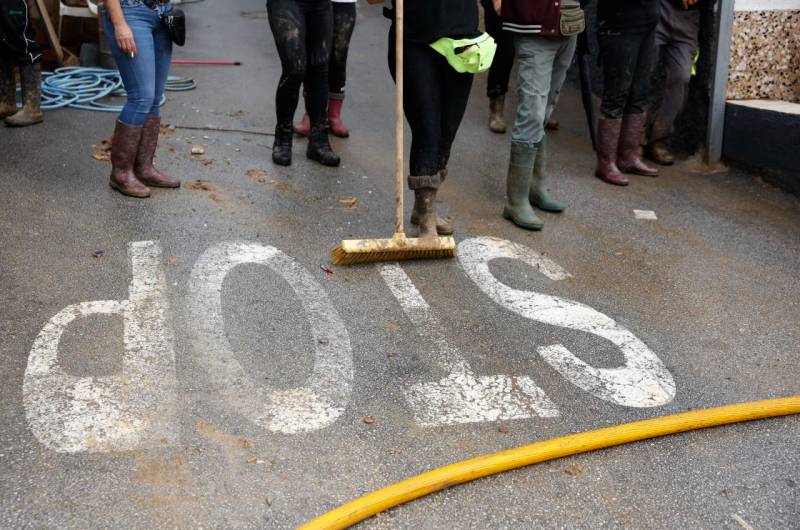
Sorry to keep going on about it but what Spain is going through right now really is unprecedented. Incredibly, the storms continue in Spain. More than two weeks on from the DANA storm that caused so much death and destruction in Valencia, another DANA weather system has struck the south and east of the country.
A quick reminder is in order here that DANA is a technical term used by meteorologists to refer to a phenomenon whereby a cold air jet stream collides with warmer, humid air from the Mediterranean Sea and creates large and powerful rainstorms. It’s not a DANA every time it rains now, but these two large storms in the past three weeks have been DANAs.
I can’t remember a time when there have been this many large, long-lasting and destructive storms in Spain in such a short space of time. It is having a serious effect on people’s homes, livelihoods and the way Spain thinks about its crisis response tactics and its approach to how it will protect people in the coming decades against more extreme weather events caused by the changing climate.
This week, it was mainly Andalucía’s turn to get the worst of the DANA, especially the coastal provinces of Málaga, Huelva and Almería. There were red alerts for heavy rain and gale-force winds on Wednesday and Thursday, but this time people were ready for it and made sure to take it very seriously, learning from the mistakes made in Valencia.
Officials warned residents to stay indoors and avoid travel unless absolutely necessary. By mid-morning on Wednesday, Málaga was bracing for potential flash floods and damage across the Guadalhorce Valley, the Axarquía and beyond. Rainfall of up to 120 litres per square metre was predicted in a single 12-hour period, while nearby regions like Antequera and Ronda faced their own yellow and orange alerts for downpours.
As expected, the storm didn’t disappoint: by Thursday morning, Málaga’s historic centre looked like a ghost town, with the normally bustling streets eerily deserted and many businesses choosing to close. Amazingly, one business that did stay open was a car wash, and even more amazingly one clever dick thought it would be a good time to wash his car, while the rain lashed down around him.
Un señor limpiando el coche en Málaga en plena Dana. Este país no te lo acabas. pic.twitter.com/VtUN9I4dhk
— Eva Helada (@evaspinola70) November 13, 2024
Others who dared to venture out went straight to the essentials – grocery shops and pharmacies. Queueing up despite power cuts, shoppers stocked up on items like bottled water, fresh produce and dairy, while pharmacists saw a run on baby food and medicines. It all had a strangely apocalyptic feel, reminiscent of the pandemic lockdowns, as emergency alerts screeched through mobile phones.
Still, it was all really just a symptom of how much better prepared they were this time, as nearly 4,000 people were evacuated from their homes near the swelling Guadalhorce and Campanillas rivers.
And it wasn’t just Málaga. In Almería province, heavy rainfall turned roads into rivers, with municipalities like El Ejido, Roquetas de Mar and Vícar facing a barrage of emergency calls as cars were swept away and homes flooded.
While the Poniente side of the province region bore the brunt of the weather, much of Almería city remained surprisingly dry, spared the worst of the storm. However, the downpour wreaked havoc on key routes, with the A-7 motorway in Balanegra closed until this Friday due to a damaged drainage pipe.
Just a little further along the coast, the situation in Murcia was less extreme. On Wednesday, while parts of Cartagena and Lorca were drenched in 30 litres of rain per square metre, the north of the region received a very different kind of surprise: snowfall.
Moratalla’s mountains donned a layer of early snow, turning the landscape into a winter wonderland. So, while Murcia’s coastal towns dealt with flood warnings and road closures, the inland areas enjoyed an unexpectedly festive touch of snow.
😍❄️Espectacular la nevada en cotas superiores a 1500 msnm. Peña de Moratalla (#Murcia #Albacete)
— Suremet (@MeteoChatSE) November 13, 2024
📹 @Jdsarrion @Avilesero pic.twitter.com/ytzdK4kRBl
Incredibly – or perhaps all too believably – it seems that opportunistic scammers have been quick to pounce on the public’s anxiety. Aemet issued a warning against fake text message alerts being sent out to people’s phones that claim to be from them.
 These messages, supposedly about severe storms, included a malicious link designed to install malware on phones. They have said that they absolutely do not ever communicate via SMS, instead relying on official notifications, usually without links, to ensure public safety. The true mobile alerts used by authorities in emergencies, like the ones issued during these storms, are straightforward and don’t come with any links.
These messages, supposedly about severe storms, included a malicious link designed to install malware on phones. They have said that they absolutely do not ever communicate via SMS, instead relying on official notifications, usually without links, to ensure public safety. The true mobile alerts used by authorities in emergencies, like the ones issued during these storms, are straightforward and don’t come with any links.Also, with countless vehicles submerged or swept away, many people have been left asking: who foots the bill for such unforeseen disasters? Although most people pay their car insurance annually, many policies don’t cover extraordinary weather events like a DANA.
Here’s where Spain’s Insurance Compensation Consortium steps in. This public entity, part of the Ministry of Economic Affairs, handles claims from extraordinary incidents, covering property, vehicle and even accommodation expenses if homes are uninhabitable.
As of now, around 40,000 affected drivers have sought help from the Consortium, a move reminiscent of previous crises, such as the La Palma volcanic eruption back in 2021.
There is a silver lining, albeit faint: for this weekend, meteorologists have predicted that the storm will morph into an isolated cold front, known in meteorological circles as a BFA. Unlike a DANA, a BFA is much more predictable, offering a little more respite and, hopefully, fewer surprises.
Although southern Spain may still experience some heavy showers, these should become less intense, with scattered rainfall replacing the current deluge by Friday and Saturday.
As Spain continues to try to pick up the pieces and hopes that no further DANAs are on the way, a new type of storm response is emerging, one that may become routine in a country increasingly battered by extreme weather.
Authorities have had to fine-tune their emergency protocols, from widespread evacuations to automated public alerts, to mitigate the escalating risk of floods. In the wake of such extreme weather, many people here in Spain find themselves not just bracing for the next storm, but also adapting to a new normal where disaster preparedness becomes second nature, just like drinking water and wearing sun cream in summer.
Murcia
The Region of Murcia government has launched a “shock plan” against the pine processionary caterpillar this week to try to stamp out a boom in populations caused by continuing warm weather. Because even though it’s been a wet few weeks, it’s actually still pretty mild, leading the processionary caterpillars to abound even now.
As if the appearance of these pests in their signature nose-to-tail “procession” isn’t menacing enough, these little beggars come equipped with poisonous hairs that can cause severe allergic reactions for humans and can even be fatal for pets.
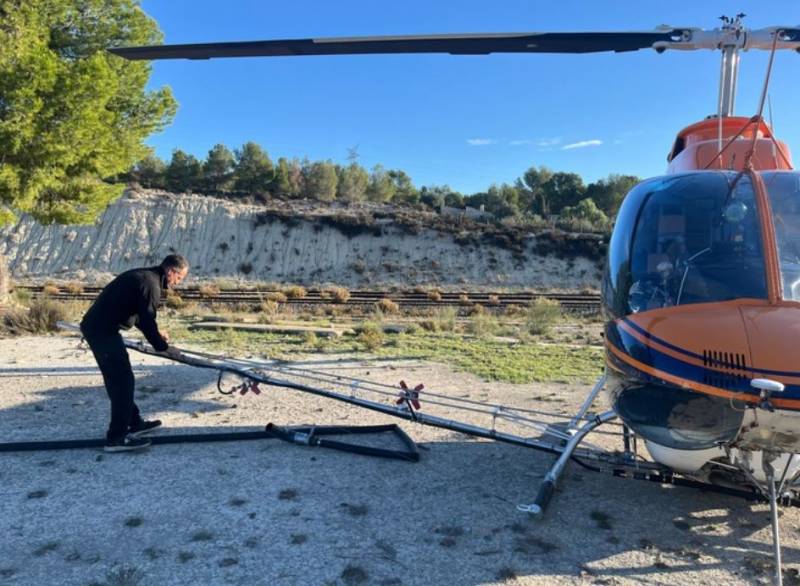 Processionary caterpillars often set up camp in pine forests, which is why local authorities are deploying fumigation helicopters which are spraying poison-free biological insecticide across nearly 1,700 hectares of forest to launch an aerial assault on these creepy-crawlies, mainly in the centre and northwestern parts of the Region – the bits with the mountains.
Processionary caterpillars often set up camp in pine forests, which is why local authorities are deploying fumigation helicopters which are spraying poison-free biological insecticide across nearly 1,700 hectares of forest to launch an aerial assault on these creepy-crawlies, mainly in the centre and northwestern parts of the Region – the bits with the mountains.Elsewhere in the Murcia skies, airlines are discussing why Murcia’s ‘new’ 5-year-old airport hasn’t become the bustling aviation hub it was toted to be. Well, it’s apparently a case of “if you build it, they won’t come (unless there are enough hotels).”
At the recent 1st Tourism Convention for the Region of Murcia, airline executives – including those from Jet2.com and easyJet – made it clear that Corvera’s expansion is limited by a simple lack of beds.
Without enough places for travellers to rest their heads, especially on the coast, airlines say they find it hard to justify adding more routes at the airport, something people in the area have long been clamouring for.
While the demand for flights is there, Murcia is mainly a destination for second-home travellers rather than tourists, they say, which doesn’t quite fit with the airlines’ post-pandemic business models that depend heavily on package tour operators and consistent bookings.
The Tourism Convention came just a day after the official stats for passenger numbers in the month of October were released by Aena, and the results tell a predictably familiar story.
Passenger numbers dipped yet again, marking the second consecutive month of decline. For the year so far, the airport has seen a 2% rise in comparison with the same period in 2023, but it is still almost 17% below the passenger numbers it handled back in 2019 when it first opened.
The airline execs aren’t mincing any words: Murcia’s going to need more hotels to compete with other destinations like Almería, which can keep the tourists flowing all year.
In more positive news, the Mar Menor could soon be getting a Biosphere Reserve status from UNESCO thanks to a newly commissioned government study.
As we all know, the Mar Menor has been plagued by pollution and ecological issues, and while it’s already protected under no fewer than 10 different environmental designations, the lagoon’s health isn’t getting much better.
A Biosphere Reserve status could be the magic bullet (or at least that's the hope). It is basically a designation that recognises an area’s unique natural and cultural values, and aims to promote sustainable development and conservation. Spain has a total of 55 Biosphere Reserves, but none of them are located in the Region of Murcia.
Two serious attempts have been made in the past to achieve Biosphere Reserve status in Murcia: Calblanque in 2008 and Sierra Minera in 2013, but neither got over the finish line.
Environmentalists, however, are being cautious of overestimating the panacea effect of Biosphere Reserve status for the Mar Menor, warning that any protective designation needs to be “serious” to fend off economic pressures that may prioritise profits over protection, such as building willy-nilly around the outskirts of the lagoon.
Thinking optimistically, if the UNESCO Biosphere Reserve scheme does go through, the designation could not only aid conservation but also draw eco-tourists to the area. Apparently.
On the subject of attracting visitors, Espacio Mediterráneo in Cartagena is doing its bit to bring in the crowds by hosting its so-called ‘Fortuna Vibes’ promotion until November 24.
It basically means visitors can pick up a small gift with a coupon when they go along, and there’s also a range of workshops going on for anyone who fancies a break from shopping, just in case holiday retail therapy isn’t quite therapeutic enough.
Meanwhile, history lovers can rejoice, too. The famed Phoenician vessel ‘Mazarrón II’, which has been lying on the seabed off Puerto de Mazarrón for more than two and a half millennia, has finally been completely raised.
Extracting this 2,600-year-old boat in one piece was never going to happen, so divers lifted it in 22 sections, each carefully mapped to preserve the structure. Once restored, it’s expected to become a major attraction, showcasing Murcia’s ancient maritime past.
 In addition, a dash of sporting glory hit the region when English golfer Simon Griffiths clinched his first victory on the Legends Tour at La Manga Club’s Farmfoods European Senior Masters 2024. Not only did he pocket a cool 56,000 euros, but he also helped put Murcia’s golfing scene – and in particular La Manga Club – on the map.
In addition, a dash of sporting glory hit the region when English golfer Simon Griffiths clinched his first victory on the Legends Tour at La Manga Club’s Farmfoods European Senior Masters 2024. Not only did he pocket a cool 56,000 euros, but he also helped put Murcia’s golfing scene – and in particular La Manga Club – on the map.His triumph follows the win by Patrik Sjöland last year in a tournament hosted by golfing legend Peter Baker. As well as the excellent golf on display, it was a thoroughly enjoyable weekend for everyone who went along. At Spain Today Online, along with our partners TKO Radio, we gave away 60 free tickets to the event in a competition, and those lucky winners gave us feedback that they had a “superb” time with “great golf, course conditions and weather”.
What’s going on in Murcia over the coming days? There’s a tapas route in San Javier for the next couple of weeks, a beer festival in Moratalla, mushrooms in Cehegín and, believe it or not, a Christmas market in Bolnuevo already!
See our EVENTS DIARY for more events and activities coming up soon in the Region of Murcia:
Spain
Spain is still deep in the midst of a cost-of-living crisis. Salaries these days may be more in line with the rest of Europe, but as the price of food, basic services, fuel and energy continue to rise, many people are struggling to make ends meet. The old adage of ‘living the dream’ on the sunny Iberian Peninsula just doesn’t seem to hold water in the same way it used to.
One aspect of this ‘dream’ is owning a Spanish casa, but buying a property in Spain is sadly now well out of reach for many on modest incomes. According to the latest data, house prices across the country have reached an all-time high, with a staggering 9.6% increase in October compared to the same month last year.
The average price per square metre now stands at a monstrous 2,209 euros, leaving many aspiring homeowners wondering how they’ll ever save enough for a deposit, let alone afford the mortgage repayments.
To put this into perspective, buying a modest 50-square-metre home would require a minimum deposit of 33,135 euros, while a more spacious 80-square-metre property would need a staggering 53,016 euro down payment. And that’s not even taking into account the additional 10% needed for other costs, like mortgage fees and taxes.
Of course, the price of housing varies widely from community to community, and new builds and second-hand homes are always going to cost more in the big cities and coastal tourist hotspots. But there are still some deals to be had and today, the five cheapest regions in Spain to purchase property are Castilla-La Mancha, Extremadura, Castilla y León, La Rioja and the ever-popular Region of Murcia, where the average price per square metre ranges from just 937 to 1,342 euros.
On the other hand, the most expensive autonomous communities for new buyers are the Balearic Islands, Madrid, the Basque Country, the Canary Islands and Catalonia, where the average price per square metre ranges from 2,443 to 4,663 euros. In these regions, the savings requirements are eye-watering, with the Balearic Islands requiring a staggering 111,912 euros for an 80-square-metre home.
But it’s not just buying a home that’s a challenge in Spain – finding a decent rental property can be just as daunting. According to a recent study, one in every six homes advertised for rent is snapped up within 24 hours, meaning that house hunters really need to turn their online scrolling into a full-time job if they’re to find a place to call home.
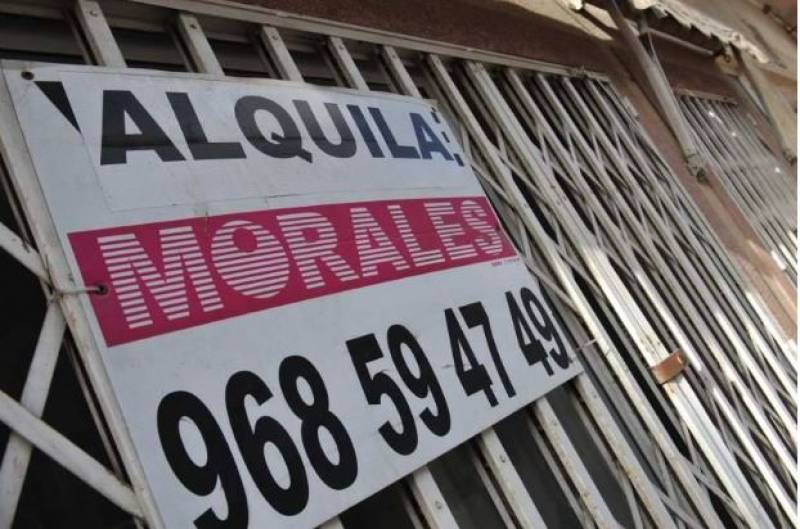
It’s a seriously competitive market and would-be renters are likely competing with dozens of others trying to secure a long-term let. Naturally, this age-old supply versus demand conundrum is also grossly inflating rental prices.
Just as with property purchases, the interest in leased apartments and houses isn’t the same everywhere.
In Segovia, which is around 90 kilometres from the Spanish capital, for example, 31% of rental contracts are signed in less than a day, while in Guadalajara and Palma de Mallorca, 26% of flats are rented out in the blink of an eye.
Even in cities with slower rental markets, such as Alicante and Madrid, 15-17% of properties are still rented in less than 24 hours.
The speed at which rental properties are being snatched up is driven in part by the country's chronic housing shortage, which has pushed demand - and prices - to unprecedented levels. In Palma de Mallorca, for example, the average price per square metre is around 17 euros, making a 70-metre flat cost an average of 1,190 euros per month.
When you think about it, this is a lot more than most people would spend on their monthly mortgage repayments, but considering the fact that home loan deposit amounts are so high, many are stuck in a hopeless lose-lose situation.
But what if we told you there was actually a way to own an enormous Spanish mansion, a property steeped in history with sprawling grounds and killer views, for the princely sum of zero euros? You’d think we were having you on, but the Casa de San Román, located in the Galician province of A Coruña, is about to go to auction and the price tag is absolutely nothing.
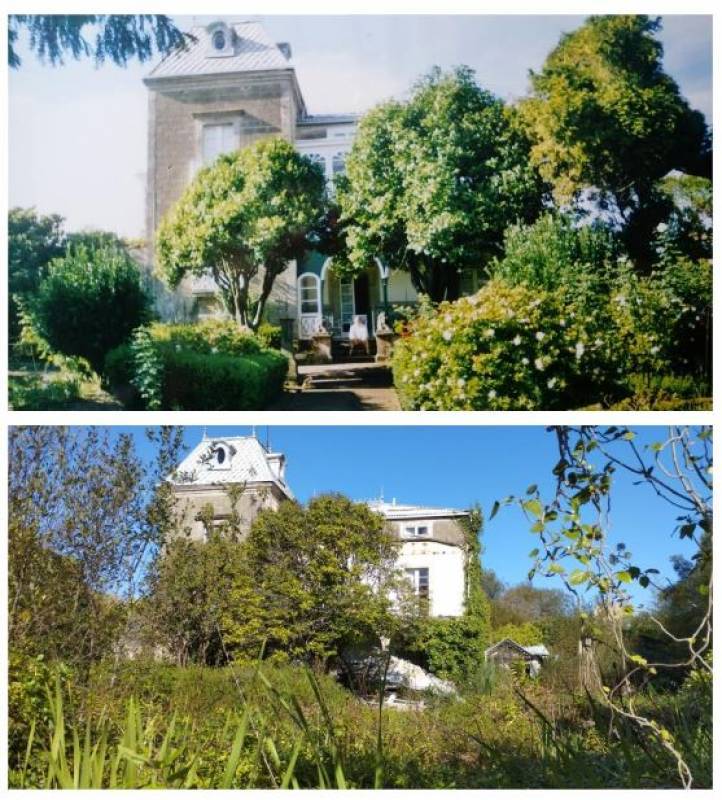 Of course, there’s always a catch, and in this case it’s a pretty big one. The huge mansion, built by the renowned hydrographer Claudio Montero Gay in the 19th century, was once a treasure trove of exotic artefacts and curiosities. A stuffed crocodile, wooden birdhouses and even a replica of the world’s largest diamond, the Ko-i-Noor, were just a few of the treasures that once adorned its walls.
Of course, there’s always a catch, and in this case it’s a pretty big one. The huge mansion, built by the renowned hydrographer Claudio Montero Gay in the 19th century, was once a treasure trove of exotic artefacts and curiosities. A stuffed crocodile, wooden birdhouses and even a replica of the world’s largest diamond, the Ko-i-Noor, were just a few of the treasures that once adorned its walls.Sadly, the mansion now sits in ruins, and most of its valuable and historic possessions were looted or lost.
Even with these challenges, the Casa de San Román remains an irresistible gem, waiting to be rediscovered and restored. Entrepreneurs and hospitality companies have shown interest in the property, but the high cost of renovation – estimated to be around 2 million euros – has deterred them.
As a result, the current owner is desperate to offload the building so he’s listed the starting price at zero. Technically, the new buyer will only need to pay an outstanding debt of 15,665.09 euros, as well as a premium of 60.50 euros to the auction house.
It’s a daunting task, but for the right buyer, the Casa de San Román could be a once-in-a-lifetime opportunity to own a piece of history.
Alicante
 There was plenty of exciting news for jetsetters this week with Jet2.com unveiling its thirteenth UK base at London Luton Airport, with nine out of its 17 new routes heading directly to Spanish destinations.
There was plenty of exciting news for jetsetters this week with Jet2.com unveiling its thirteenth UK base at London Luton Airport, with nine out of its 17 new routes heading directly to Spanish destinations.This expansion offers even more ways for UK travellers to reach the sun-drenched shores of the Costa Blanca.
Starting April 1 next year, Jet2 will fly up to four times a week from London Luton to Alicante-Elche Airport. Plus, for those looking to explore beyond the Costa Blanca, the airline will soon offer flights from Luton to a range of popular Spanish destinations, including Girona, Reus, the Canary Islands and the Balearic Islands.
Weekly flights to Girona will be available on Sundays, while Reus-bound travellers can fly twice weekly, on Mondays and Thursdays. For the Canary Islands, Jet2 will connect London Luton with Fuerteventura, Lanzarote, Gran Canaria and Tenerife Sur. As for the Balearics, Ibiza and Menorca are now just a Jet2 flight away from London’s newest base.
The expansion is another huge win for Alicante-Elche Airport, which recently celebrated its place as the fifth busiest airport in Spain and with two months left in the year, Alicante has already surpassed 2023’s passenger numbers.
Aena, Spain’s airport management company, reported 1,797,457 passengers passed through Alicante in October alone – that’s a 13.3% increase compared to the same month last year.
The yearly stats tell an even more impressive story. Since January, Alicante-Elche Airport has welcomed a record-breaking 15,891,921 travellers, a 16.5% increase from 2023.
International passengers lead the charge, accounting for 87% of the October numbers, with top arrivals from the UK, as usual, followed by the Netherlands, Germany, Belgium and Norway.
October also set a new flight record with 11,243 operations, a 13.1% rise over the previous year. After surpassing 13 million passengers in 2022 and hitting a record 15.7 million in 2023, the airport is on track to exceed 16 million passengers this year.
To keep pace with the demand, Alicante-Elche Airport has launched a major upgrade, beginning with a new taxiway that will streamline take-off and landing times.
And in even bigger news, Spain’s Transport Minister Óscar Puente recently announced a 600-million-euro investment to expand and modernise the existing terminal, promising an exciting future for Costa Blanca’s gateway to the world.
Couch surfing took on a whole new meaning in Alicante this week after an Elche man went viral for scooting down the road with an entire sofa balanced on his electric scooter.
TIKTOK
— 𝐃𝐚𝐧𝐢 (@Daaniiii00) November 10, 2024
ELCHE, UNO EN PATINETE ELÉCTRICO CON UN SOFÁ 😂😅 pic.twitter.com/90I6EOSRD9
Electric scooters have become infamous across Spain for some truly wild rides: we’ve seen people towing pushchairs, clutching beers mid-scoot and even riding two scooters at once. So maybe it’s no surprise that someone decided to take their living room furniture for a spin.
Scooters are a relatively new craze, and the authorities are still trying to catch up with the creative ways people are pushing the limits of these zippy little vehicles. With the rules still a bit fuzzy in some places, there’s room for all sorts of interpretations – but even the most generous read of the law probably wouldn’t allow a couch commute.
Needless to say, the footage has caused a social media frenzy but Elche police found it a little harder to see the funny side.
For the record, Spanish traffic laws make it pretty clear that scooters are meant for solo riders only, and adding a sofa (or anything else that size) is a big no-no. Overloading a scooter poses a hazard for the rider, other drivers and pedestrians, and could land you with a hefty fine or see your scooter impounded.
 It’s beginning to feel a lot like Christmas in Orihuela Costa with one of the most-anticipated events on the festive calendar happening this weekend – the grand switch-on of the Christmas lights in Zenia Boulevard shopping centre.
It’s beginning to feel a lot like Christmas in Orihuela Costa with one of the most-anticipated events on the festive calendar happening this weekend – the grand switch-on of the Christmas lights in Zenia Boulevard shopping centre.On Saturday November 16, Costa Blanca’s largest shopping centre will be transformed into a dazzling winter wonderland. Starting in the early evening, visitors young and old will be treated to an enchanting Christmas musical featuring some favourite festive characters like lively elves, mischievous goblins, reindeer and, of course, Santa Claus himself.
At 6pm, the countdown begins to light up a magnificent Christmas tree, accompanied by a magical snowfall that will transport everyone straight to the North Pole. And to make the night extra cosy, complimentary hot chocolate and sweet treats will be on hand for everyone to enjoy.
Once the lights are switched on, the holiday magic continues with a sparkling Christmas parade through the Boulevard, featuring hundreds of dancers, festive characters and thousands of twinkling lights.
Restaurants and leisure facilities will be open as usual, though it’s a good idea to check any reservations before the big event.
For other events and activities happening in the area, check out the What’s On page of Alicante Today or join the Costa Blanca What’s On and Where to Go Facebook group
Andalucía
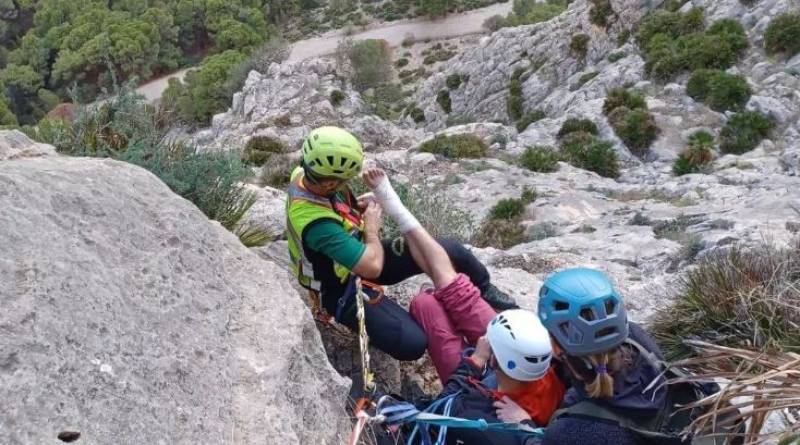 We kick off our dedicated Andalucía section this week with the case of the young British climber whose thrill-seeking adventure in Málaga ended in a bit more excitement than planned.
We kick off our dedicated Andalucía section this week with the case of the young British climber whose thrill-seeking adventure in Málaga ended in a bit more excitement than planned.While attempting the “Blue Line” on the Arab Staircase in El Chorro, the 20-year-old Brit plunged from a heart-stopping height, catching himself only with safety ropes as he dangled Tom Cruise-like some 200 metres above the ground.
His climbing buddy quickly dialled 112 for help, setting off an epic rescue involving the Guardia Civil’s elite Mountain Rescue and Intervention Group, or Greim. Navigating treacherous terrain and pulling out all the stops with a helicopter and a crane, the Greim team managed to extract the injured adventurer and fly him to hospital in Málaga, where it was determined that he was lucky to escape with just a leg injury.
Recent seismic activity has kept Cádiz and Huelva on their toes of late, with two larger-than-usual earthquakes hitting the area in less than a week.
Both quakes registered a solid 3.7 on the Richter scale, striking nearly identical locations with some slight variations in depth. Fortunately, there were no injuries or damages, but these tremors are a reminder of Andalucía’s tectonic dance between the Eurasian and African plates.
But if you think that sounds dramatic, look back at the 6.3-magnitude quake in Almería in 2004, which left real structural chaos in its wake. By comparison, these latest quakes are nothing more than a little vibration.
Also making waves is the case of a Carrefour cashier in Almería named Julieta found herself at the wrong end of the law, and of company policy, when she allegedly pocketed 12 euros in customer vouchers. Apparently, she planned to quietly redeem these for her own purchases, but it didn’t quite pan out as the supermarket chain quickly caught on.
Her bosses quickly fired her, citing a breach of trust, and Julieta’s first appeal saw a judge rule the dismissal as unfair. But Carrefour wasn’t about to let this one slide; they took the case all the way to Andalucía’s High Court, arguing that Julieta’s actions broke the fundamental bond of trust in the workplace, even though it was only 12 euros.
The court agreed, ruling that the dismissal was indeed justified as the coupon usage amounted to misappropriation and breached contractual good faith. It just goes to show, crime doesn’t pay, not even in discount vouchers.
Finally, what’s truly unsettling residents is the housing crisis in Andalucía. Tens of thousands recently took to the streets of Sevilla, Cádiz and Málaga to protest spiralling rent prices and the invasion of tourist rentals.
Platforms like Málaga Para Vivir, Sevilla Para Vivir and Cádiz Resiste rallied locals to demand that housing be for living, not for profit. These demonstrators argue that the government’s current approach has turned their cities into theme parks, pushing out residents in favour of high-yield holiday rentals.
They insist that a line must be drawn, calling for affordable housing and policies that prioritise community stability over tourism. It comes after repeated tourist overcrowding protests this summer, and local government teams are already taking the issue very seriously, trying to regulate and restrict tourist lets like Airbnb.
Málaga’s Plaza de la Merced saw some of the largest gatherings last weekend, with protesters chanting slogans like, “The city is not a business, it’s a place to live!”
Not to be outdone, Seville brought 35,000 people to the streets, while Cádiz residents voiced fears that unchecked tourism will see them priced out of their own neighbourhoods.
Even smaller towns like Tarifa and La Línea de la Concepción (just across the line from Gibraltar) echoed these concerns, highlighting the deep-rooted frustration with a housing market that locals feel is increasingly out of their reach.
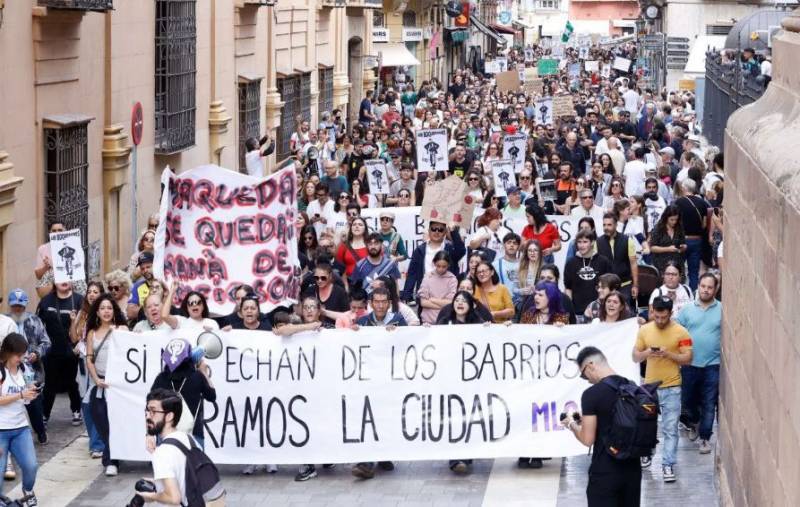
You may have missed…
- IN PHOTOS—1,000s of Brits descend on Benidorm for the biggest fancy dress party in Europe!
Benidorm is always a pretty colourful spot but locals and visitors took things to a whole new level on Thursday with the return of the annual costume party, the largest street fancy dress gathering in all of Europe! - Rumours abound regarding new Camposol Hospital.
The new Mederi Guadalentin hospital on the Camposol urbanisation has recently been the focus of social media rumours and speculation, with an online media article adding to the confusion. Are the staff on strike? Has the hospital closed? Does it have new owners? We approached them with these and more questions to get the truth straight from the horse’s mouth... - More ear-splitting sonic booms in Lorca next week.
Expect sonic booms and loud aircraft noise over Lorca between the hours of 3.30pm and 5.30pm, from November 18-28. - Pioneering breakthrough made in Murcia: Pig farms with no bad odours or greenhouse gases.
A Murcia company has won London's World Finance award for creating a world's first – a pig farm that doesn't release any bad smells or emit any greenhouse gases. - Catch Spain’s last full supermoon of the year this week.
Look to the skies... there’s a full moon tonight – Spain’s fourth and final supermoon of 2024, the so-called Beaver Moon!
And that’s all for this week. Have a good weekend, everyone, and stay dry!
See ya!
Contact Murcia Today: Editorial 000 000 000 /
Office 000 000 000

























